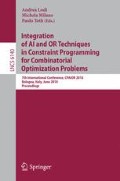Abstract
We propose a hybrid approach for solving the resource-constrained project scheduling problem which is an extremely hard to solve combinatorial optimization problem of practical relevance. Jobs have to be scheduled on (renewable) resources subject to precedence constraints such that the resource capacities are never exceeded and the latest completion time of all jobs is minimized.
The problem has challenged researchers from different communities, such as integer programming (IP), constraint programming (CP), and satisfiability testing (SAT). Still, there are instances with 60 jobs which have not been solved for many years. The currently best known approach, lazyFD, is a hybrid between CP and SAT techniques.
In this paper we propose an even stronger hybridization by integrating all the three areas, IP, CP, and SAT, into a single branch-and-bound scheme. We show that lower bounds from the linear relaxation of the IP formulation and conflict analysis are key ingredients for pruning the search tree. First computational experiments show very promising results. For five instances of the well-known PSPLib we report an improvement of lower bounds. Our implementation is generic, thus it can be potentially applied to similar problems as well.
Access this chapter
Tax calculation will be finalised at checkout
Purchases are for personal use only
Preview
Unable to display preview. Download preview PDF.
References
Achterberg, T.: SCIP: Solving Constraint Integer Programs. Math. Programming Computation 1, 1–41 (2009)
Achterberg, T., Berthold, T.: Hybrid branching. In: van Hoeve, W.-J., Hooker, J.N. (eds.) CPAIOR 2009. LNCS, vol. 5547, pp. 309–311. Springer, Heidelberg (2009)
Baptiste, P., Pape, C.L.: Constraint propagation and decomposition techniques for highly disjunctive and highly cumulative project scheduling problems. Constraints 5, 119–139 (2000)
Berthold, T., Heinz, S., Lübbecke, M.E., Möhring, R.H., Schulz, J.: A constraint integer programming approach for resource-constrained project scheduling, ZIB-Report 10-03, Zuse Institute Berlin (2010)
Błażewicz, J., Lenstra, J.K., Kan, A.H.G.R.: Scheduling subject to resource constraints: classification and complexity. Discrete Appl. Math. 5, 11–24 (1983)
Hartmann, S., Briskorn, D.: A survey of variants and extensions of the resource-constrained project scheduling problem. Eur. J. Oper. Res. (2009) (in press) (Corrected Proof)
Klein, R., Scholl, A.: Computing lower bounds by destructive improvement: An application to resource-constrained project scheduling. Eur. J. Oper. Res. 112, 322–346 (1999)
Möhring, R.H., Schulz, A.S., Stork, F., Uetz, M.: Solving project scheduling problems by minimum cut computations. Manage. Sci. 49, 330–350 (2003)
Pritsker, A.A.B., Watters, L.J., Wolfe, P.M.: Multi project scheduling with limited resources: A zero-one programming approach. Manage. Sci. 16, 93–108 (1969)
PSPLib, Project Scheduling P roblem LIBrary, http://129.187.106.231/psplib/ (last accessed 2010/February/01)
Schutt, A., Feydy, T., Stuckey, P., Wallace, M.: Why cumulative decomposition is not as bad as it sounds. In: Gent, I.P. (ed.) CP 2009. LNCS, vol. 5732, pp. 746–761. Springer, Heidelberg (2009)
SCIP, Solving Constraint Integer Programs, http://scip.zib.de/
Valls, V., Ballestín, F., Quintanilla, S.: Justification and RCPSP: A technique that pays. Eur. J. Oper. Res. 165, 375–386 (2005)
Author information
Authors and Affiliations
Editor information
Editors and Affiliations
Rights and permissions
Copyright information
© 2010 Springer-Verlag Berlin Heidelberg
About this paper
Cite this paper
Berthold, T., Heinz, S., Lübbecke, M.E., Möhring, R.H., Schulz, J. (2010). A Constraint Integer Programming Approach for Resource-Constrained Project Scheduling. In: Lodi, A., Milano, M., Toth, P. (eds) Integration of AI and OR Techniques in Constraint Programming for Combinatorial Optimization Problems. CPAIOR 2010. Lecture Notes in Computer Science, vol 6140. Springer, Berlin, Heidelberg. https://doi.org/10.1007/978-3-642-13520-0_34
Download citation
DOI: https://doi.org/10.1007/978-3-642-13520-0_34
Publisher Name: Springer, Berlin, Heidelberg
Print ISBN: 978-3-642-13519-4
Online ISBN: 978-3-642-13520-0
eBook Packages: Computer ScienceComputer Science (R0)

